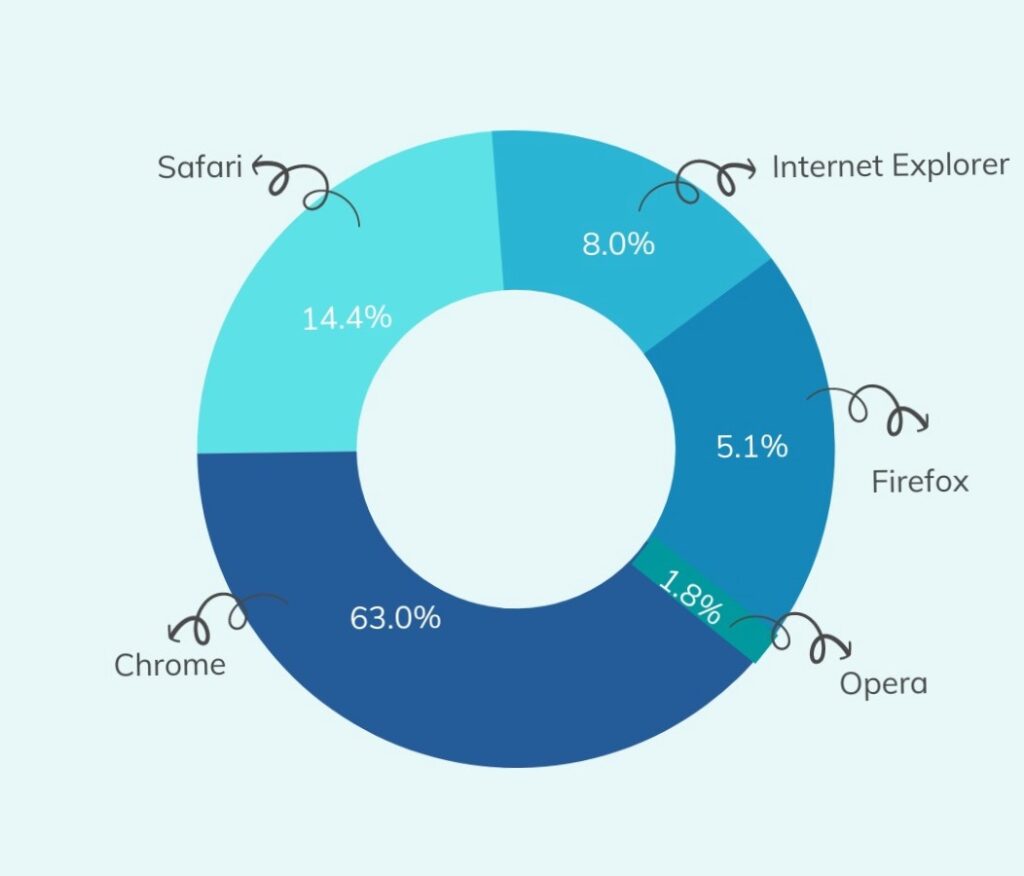Google has announced that it will stop the use of third-party cookies in Chrome by the end of 2023, effectively limiting advertisers’ ability to identify users across the web, joining a growing list of browsers ditching the notorious tracking technology.
Cookies are nothing but text files stored on your computer or phone. According to an article on the post-third-party cookie era, Chrome is the most common browser with over 63% of the market share globally. This update comes as a scary prospect for anybody whose business relies on affiliate marketing or remarketing and even more so for the digital marketing industry. Although the shift is seen as a step towards making the internet safer and more transparent because it protects users from having their data collected and sold by third parties, businesses could well suffer from this loss.
This is one of marketers’ most effective means of tracking and targeting consumers online. Considering these developments, brand managers and digital advertisers have to figure out new ways to connect the dots between creative, direct, and digital media, leveraging first-party data wherever available.
In this blog post, we’ll look at what impact does Google’s decision to end third-party cookies in Chrome will have on online advertising/marketing. This decision brings up questions about whether ad fraud will increase and whether it makes reporting campaign outcomes impossible.
Let’s look at the different browsers that are affected by this update and their percentages of market shares.


But there is no need to panic, Google will still be able to track users through data collected from its Maps, Search, mobile devices, and targeted ads to users based on their behavior including Youtube, which makes up the majority of the revenue and won’t be affected by the change.
The company also said that these changes only apply to ad tools and unique identifiers for websites.
How Does the Cookie Crumble?
Third-party cookies are small pieces of data that are stored on an internet user’s browser. These cookies contain third-party data, such as user identification.
When cookies are used in conjunction with scripts, they can be used for retargeting, user tracking, and conversion attribution.
For example, a “Download” button on your website can store a cookie on the visitor’s computer, which later can be read by Facebook to identify visitors and see which websites they have visited.
So that’s all about a third-party cookie.
The advertising industry has been using this technology for years to collect data and target relevant ads to audiences. Just like retargeting when you search for a product online and you get relevant ads on your social media platforms.
What Does the Future Look Like For Digital Marketers?
Due to the absence of third-party cookies, up to 90% of display impressions will have no ID attached to them. Today’s post-cookie world requires advertisers to take a portfolio of approaches, including solutions that target ads without IDs. To effectively target audiences at scale.
The outcome of taking out targeted marketing will impact everyone, from web users to digital marketers to publishers.
Marketers will not invest in online marketing unless they have adequate tracking capabilities, because they want to ensure that their promotions reach the right customers even if they might have to pay more for those potential prospects.
What Does the Future Look Like for Digital Marketing?
In this ‘Cookieless’ world marketers will have to look for different solutions for retargeting campaigns.
One solution is to use first-party data, such as user IDs and email addresses, to find the necessary information. Match2one has said that ad tech companies such as Xandr and The Trade Desk are working on ways of tracking users while protecting their privacy.
Xandr has shared its multifaceted approach to identity solutions. The solution facilitates high-value transactions for buyers and sellers after third-party cookies are removed.
This solution enables marketers to flexibly work with first-party data along with technology to execute audience-based buying across multiple screens.
Xandr’s solution will help marketers because it will support browser-provided frameworks and ad-serving without the need to collect personal data.
Removing third-party cookies has changed the whole outlook of the Digital world. Most of the brands post the removal of the third-party cookies are looking into contextual advertising/marketing and good management of first-party cookies as alternatives. This could change the face of Digital Marketing in the future and find new ways to use Digital Marketing as well.
Unified ID 2.0 the new alternative for a Cookie-less world:
Xandr and The Trade Desk, among others, are supporting a unified ID system that would allow advertisers and marketers to use the same ID for multiple exchanges.
Unified ID 2.0 is an industry initiative to create a new standard for user identification on the web. It will replace cookies as a means of uniquely identifying website visitors.
For example, when a user logs onto the site, it will create an identifier based on an anonymized version of the user’s email address. The identifier will regenerate itself regularly to ensure security.
Unified ID 2.0 is a cookie developed with users’ preferences in mind so that they can easily share their data as they like.
Conclusion:
The alternative to the removal of third-party cookies comes as a positive development because it gives the internet users the option to opt-in or out of sharing data and receiving ads. The consequences of this update are higher ad relevance, better user experience, and more cost-efficient targeting for brands.
Google’s announcement of removing the third-party cookies is not surprising, to say the least, and the solution to move forward is to adapt to a cookie-less internet experience.
The way forward to cope especially for the Digital Marketing world is not going to be easy to manage for brands, marketers, and advertisers alike, but with the alternative solutions that are being worked on we can look forward to a positive future.



We hope you’re enjoying reading our blogs… Don’t forget to secure your browsing experience with Nord VPN. Click the banner below to learn more
More To Explore
Redefining Digital Marketing in 2024: 10 Game-Changing Trends
In the ever-evolving world of digital marketing, staying ahead of the curve is essential. As we approach 2024, it’s crucial to be aware of the
SEO Mania-7 Proven Strategies for Explosive SEO Growth in 2024
Understanding the Importance of SEO in 2024 In the ever-evolving world of SEO, staying ahead of the curve is crucial to your online success. As